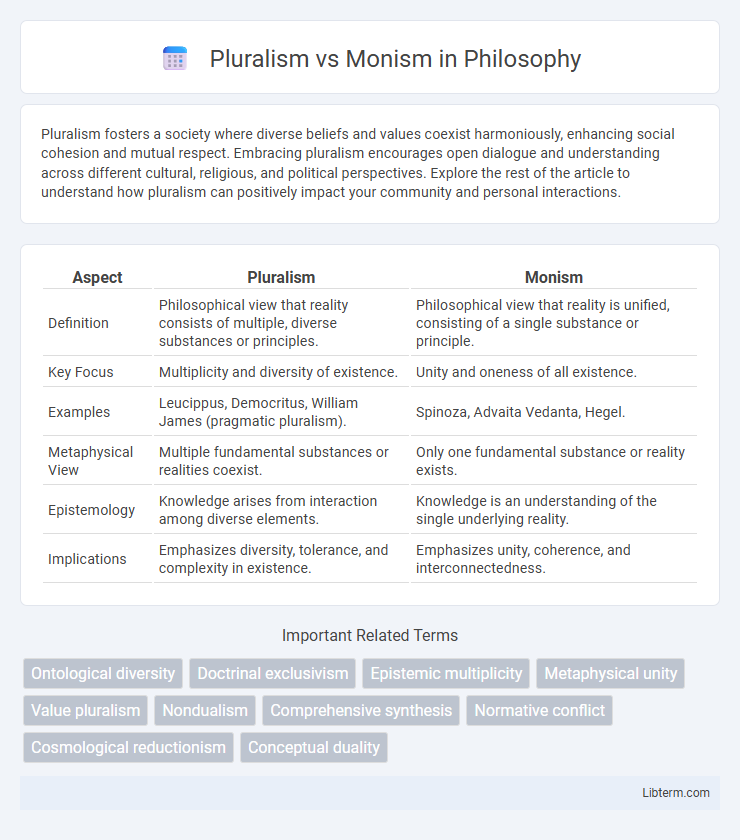Pluralism fosters a society where diverse beliefs and values coexist harmoniously, enhancing social cohesion and mutual respect. Embracing pluralism encourages open dialogue and understanding across different cultural, religious, and political perspectives. Explore the rest of the article to understand how pluralism can positively impact your community and personal interactions.
Table of Comparison
| Aspect | Pluralism | Monism |
|---|---|---|
| Definition | Philosophical view that reality consists of multiple, diverse substances or principles. | Philosophical view that reality is unified, consisting of a single substance or principle. |
| Key Focus | Multiplicity and diversity of existence. | Unity and oneness of all existence. |
| Examples | Leucippus, Democritus, William James (pragmatic pluralism). | Spinoza, Advaita Vedanta, Hegel. |
| Metaphysical View | Multiple fundamental substances or realities coexist. | Only one fundamental substance or reality exists. |
| Epistemology | Knowledge arises from interaction among diverse elements. | Knowledge is an understanding of the single underlying reality. |
| Implications | Emphasizes diversity, tolerance, and complexity in existence. | Emphasizes unity, coherence, and interconnectedness. |
Understanding Pluralism and Monism
Pluralism recognizes multiple perspectives and realities coexisting within a system, emphasizing diversity and the acceptance of different truths or principles. Monism asserts a single underlying reality or principle, advocating for unity and singularity in explanation or existence. Understanding pluralism and monism involves analyzing how these philosophies address diversity versus unity in metaphysics, ethics, and epistemology.
Historical Roots of Pluralism and Monism
Pluralism traces its historical roots to ancient Greek philosophers like Heraclitus and Democritus, who emphasized diversity and the existence of multiple substances or principles in reality. Monism originated with thinkers such as Parmenides and Spinoza, advocating for a single, unified underlying substance or principle governing existence. These foundational ideas laid the groundwork for ongoing debates in metaphysics and ontology regarding the nature of reality and multiplicity.
Key Philosophical Differences
Pluralism asserts that reality consists of multiple fundamental substances or principles, emphasizing diversity and complexity in existence, whereas monism posits a single substance or principle as the foundation of all reality. In philosophical discourse, pluralism allows for a variety of entities or realities coexisting independently, while monism seeks unity and coherence under one ultimate entity or concept. This key difference influences metaphysical interpretations, with pluralism supporting multiplicity and monism emphasizing oneness.
Pluralism in Modern Society
Pluralism in modern society emphasizes diverse and coexisting cultural, political, and social groups, fostering inclusion and mutual respect among distinct identities. It supports democratic governance by encouraging multiple viewpoints and promoting dialogue to address complex social issues. This approach counters monism, which advocates a single source of truth or authority, by validating diversity as essential to societal progress and social harmony.
Monism’s Influence in Philosophy
Monism, emphasizing the unity of reality, has profoundly shaped philosophical discourse by challenging dualistic interpretations and promoting a holistic understanding of existence. Key figures such as Spinoza and Hegel advanced monistic perspectives that argue all phenomena are manifestations of a single substance or principle, influencing metaphysics, ontology, and epistemology. This influence is evident in contemporary debates about consciousness, the nature of being, and the interconnectedness of mind and matter within various philosophical traditions.
Pluralism Across Disciplines
Pluralism across disciplines acknowledges the coexistence of multiple perspectives, methodologies, and truths within fields such as philosophy, sociology, and political science. This approach challenges monism by emphasizing diversity, complexity, and the interdependence of various viewpoints, fostering a more comprehensive understanding of reality. Embracing pluralism enhances critical thinking, innovation, and inclusion by validating differing values and knowledge systems in academic and practical contexts.
Monism in Religion and Spirituality
Monism in religion and spirituality posits that all existence originates from a singular, unified reality or principle, often identified as God, Brahman, or the Absolute. This perspective emphasizes the interconnectedness of all beings, suggesting that perceived multiplicity is an illusion masking the fundamental oneness of the universe. Monistic philosophies are prominent in Hindu Vedanta, Advaita, and certain interpretations of mysticism, which advocate for spiritual realization through recognizing this ultimate unity beyond individual distinctions.
Major Thinkers and Theories
Pluralism, championed by thinkers such as William James and Isaiah Berlin, emphasizes the coexistence of multiple values, realities, or substances, opposing monism's assertion of a single fundamental principle, as advocated by philosophers like Spinoza and Hegel. James's pragmatism highlights experiential diversity, while Berlin's value pluralism argues for conflicting but equally valid moral frameworks. Monist theories, including Spinoza's substance monism and Hegel's absolute idealism, propose a unified underlying reality, contrasting with pluralist perspectives that endorse multiplicity in metaphysics and ethics.
Practical Implications of Pluralism and Monism
Pluralism encourages diverse perspectives and fosters tolerance, enabling societies to accommodate multiple values and beliefs, which can enhance democratic decision-making and conflict resolution. Monism, by promoting a singular, unified principle or truth, aims for coherence and consistency in governance and ethical frameworks, reducing ambiguity in legal and policy applications. The practical implications of pluralism include increased flexibility and inclusivity, while monism offers stability and clarity in institutional practices and social norms.
Future Perspectives on Pluralism vs Monism
Future perspectives on pluralism emphasize the integration of diverse viewpoints to address complex social and philosophical challenges, promoting coexistence and adaptive frameworks. Monism, by contrast, continues to seek unified theories that offer cohesive explanations of reality, appealing for its simplicity and systematic consistency. Emerging interdisciplinary approaches suggest a potential synthesis where pluralistic diversity informs monistic models, fostering more robust and inclusive understanding.
Pluralism Infographic

 libterm.com
libterm.com